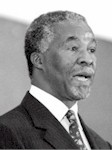Talk
of reparations, amid more signs of South Africa's racial divide
|
by Rafiq Rohan
 JOHANNESBURG�Furious debate on the outcome of
the historic racism summit in South Africa is raging in the country,
following a call for whites to acknowledge their apartheid past and make
a commitment to reparations. JOHANNESBURG�Furious debate on the outcome of
the historic racism summit in South Africa is raging in the country,
following a call for whites to acknowledge their apartheid past and make
a commitment to reparations.
While Black input into the summit was largely
constructive with an appeal to whites to show some goodwill, whites
simply retreated on the defensive, say Black analysts.
That view was countered by Dene Smuts, a member of
Parliament from the mainly white party the Democratic Party, who said,
the summit was an exercise in "the bashing of whites."
One summit participant shook his head at the end of
the meeting Aug. 30-Sept. 2 and shrugged: "Whites just don�t get
it."
They clearly don�t. The conference had just ended
when the race issues that plague the society were highlighted by a
litany of incidents construed as racist by Blacks, but not by whites.
One blatant incident was an early September encounter
with white radio-talk-show host John Robbie who, while interviewing the
Minister of Health Dr. Manto Tshabalala-Msimang told her she was
"talking rubbish!" and that she should "go away."
Blacks are outraged, arguing he would not treat a
white person with such disrespect. Whites argued, in calls to the show,
that Mr. Robbie was simply doing his job as an objective journalist.
An incident of a more subtle form of racism was
commentary that followed the U.S. Open tennis final clash between Venus
Williams, who has a huge Black following in South Africa, and Lindsay
Davenport.
At the end of the match�broadcast on independent
white-controlled M-Net television�white South African sports presenter
Tinky Pringle spent the rest of her show talking in glowing terms about
Davenport. There was not a single mention of Ms. Williams� historic
victory and achievement, say Black critics.
The worst incident happened recently, when a computer
at Pretoria�s police headquarters was found to contain a short video
on Nelson Mandela where his head turns into that of a gorilla. The
police headquarters, notorious during the apartheid days, still employs
mainly white police personnel, especially in senior ranks.
In the light of these indicators, Blacks say the race
summit did not ask for much.
The feisty Black intellectual Dr. Pallo Jordan made
an impassioned plea to whites to simply admit that they had "reaped
the fruits of apartheid."
That, Dr. Jordan said, was not an excercise in
"white bashing" but simply a statement of fact.
"The fact of the matter is that any system of
racism provides those who are part of the privileged group with unearned
rewards," Dr. Jordan said.
"If you were white in South Africa you were
always first in the job queue (line). Sometimes you were the only one in
the job queue. It is ridiculous to suggest that white and Black South
Africans are at the same starting line," he noted.
That, Dr. Jordan and a host of other participants
concluded, is the nub of the problem. Whites, they all argued, rose to
the top after receiving "unearned rewards" during apartheid
rule and that is where they still are today. It is pay-back time, the
majority at the summit argued.
As a result, the summit concluded with a proposal
that affluent whites dig into their over-full pockets and give back to
those who have borne the worst that apartheid had to offer. At first,
the proposal said, the effort would be one based on white voluntary
financial contributions.
The Black Minister of Justice, Penuell Maduna, said
if the voluntary process achieved little progress, some form of taxation
would have to be considered as a last resort.
"I am starting with the expectation that people
of goodwill and who have resources would come forward voluntarily, that
a lot of South Africans would want to help those who were disadvantaged
by apartheid," he said.
The principle is similar to one used in Germany, said
an advisor to President Thabo Mbeki, Mojanku Gumbi. In Germany,
businesses that prospered under Nazism have been prevailed upon to
cough-up for their past collusion.
In South Africa, Ms. Gumbi explained, it will be big
business that will be targeted but getting white individuals to
contribute has not been ruled out.
A rare call was made at the conclusion of the
conference by white left-wing writer Antjie Krog to declare Dec. 16 a
"Day of National Racial Reconciliation" to get Blacks and
whites to come together in a spirit of oneness and acknowledgement of
past evils.
Among other major summit resolutions were calls for
the Human Rights Commission to draw up an action plan to combat racism;
presenting anti-racism programs in schools; promoting African languages
in all sectors; and the formation of an anti-racism movement.
However, Dr. Jordan lamented, the biggest hurdle is
to get whites to accept responsibility for apartheid.
Somewhat tongue-in-cheek, he remarked: "There is
a tendency by many of our fellow citizens to induce national amnesia, so
much so that visitors to South Africa sometimes ask how apartheid was
sustained at all, since no one they meet ever supported it!"
Photo: South Africa President Thabo Mbeki |

![]()